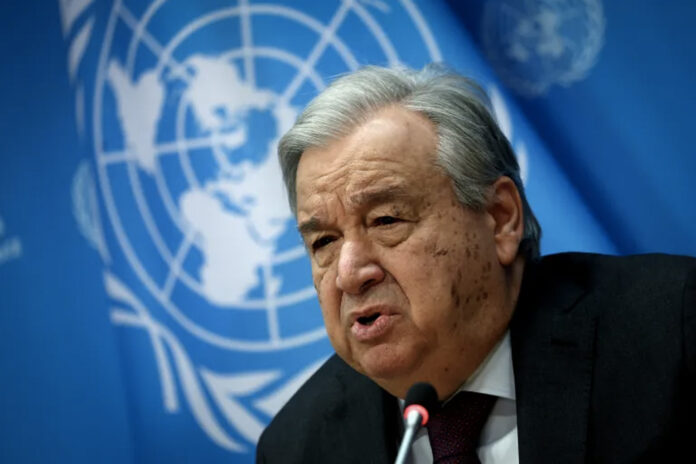United Nations Secretary-General Antonio Guterres has made an impassioned call to action, urging countries to address the effects of “crippling heat”, as the world experiences “an extreme heat epidemic” fuelled by climate change, affecting billions of people.
Speaking to reporters at a news conference on Thursday, the Guterres said “Extreme heat is increasingly tearing through economies, widening inequalities, undermining the Sustainable Development Goals, and killing people.”
He said that the unprecedented heat is driven by “fossil fuel-charged, human-induced climate change and we know it’s going to get worse. Extreme heat is the new abnormal.”
The UN Chief’s warning comes a day after the European Union’s climate monitor said the world had experienced its hottest day on record this week.
The Copernicus Climate Change Service (C3S) said on Wednesday that the global average surface air temperature on July 22 rose to 17.15 degrees Celsius (62.9 degrees Fahrenheit) – or 0.06 degrees Celsius higher than the record set just a day earlier.
Since June 2023, every successive month has been the planet’s warmest since records began in 1940, compared with the corresponding month in previous years, according to C3S.
Millions of people around the world have experienced and suffered from these record-high temperatures, including across the Middle East, Africa and Asia, where the crisis has deepened social inequalities.
More than 70 percent of the global workforce – some 2.4 billion people – are now at high risk of extreme heat, according to a report from the International Labour Organization (ILO) published on Thursday.
The statstics are quite shocking in this regard, where according to the report, Africa has nearly 93 percent of its workforce exposed to excessive heat, while the Arab states’ have 84 percent workforces exposed. Cumulatively, excessive heat has been blamed for causing almost 23 million workplace injuries worldwide, and some 19,000 deaths annually.
Global Experts also have warned that as the effects of climate change intensify, weather patterns are becoming more extreme with droughts, super-charged hurricanes, floods and wildfires affecting much of the globe. During Thursday’s news conference, Guterres said countries must reduce their reliance on fossil fuels, which worsens the climate crisis.
“Leaders across the board must wake up and step up – and that means governments, especially the G20 countries.”










